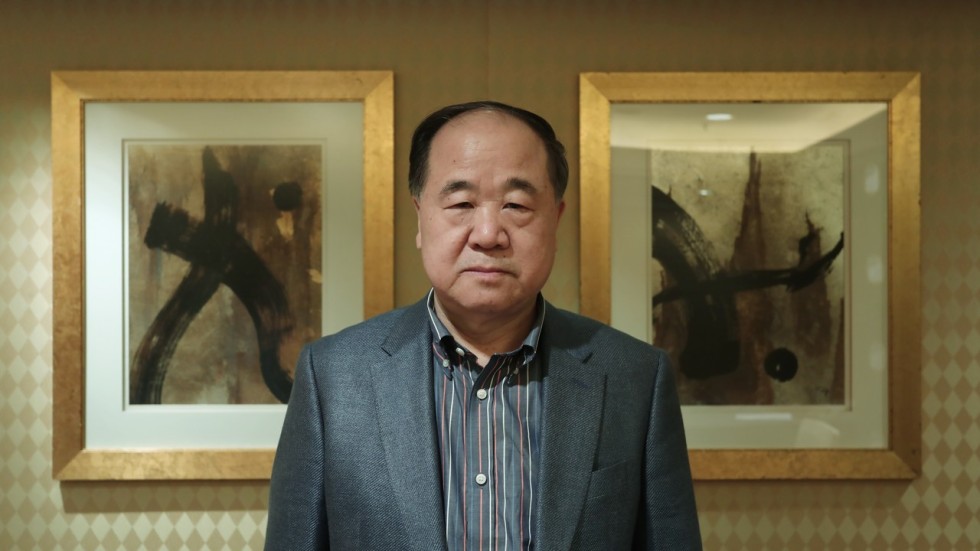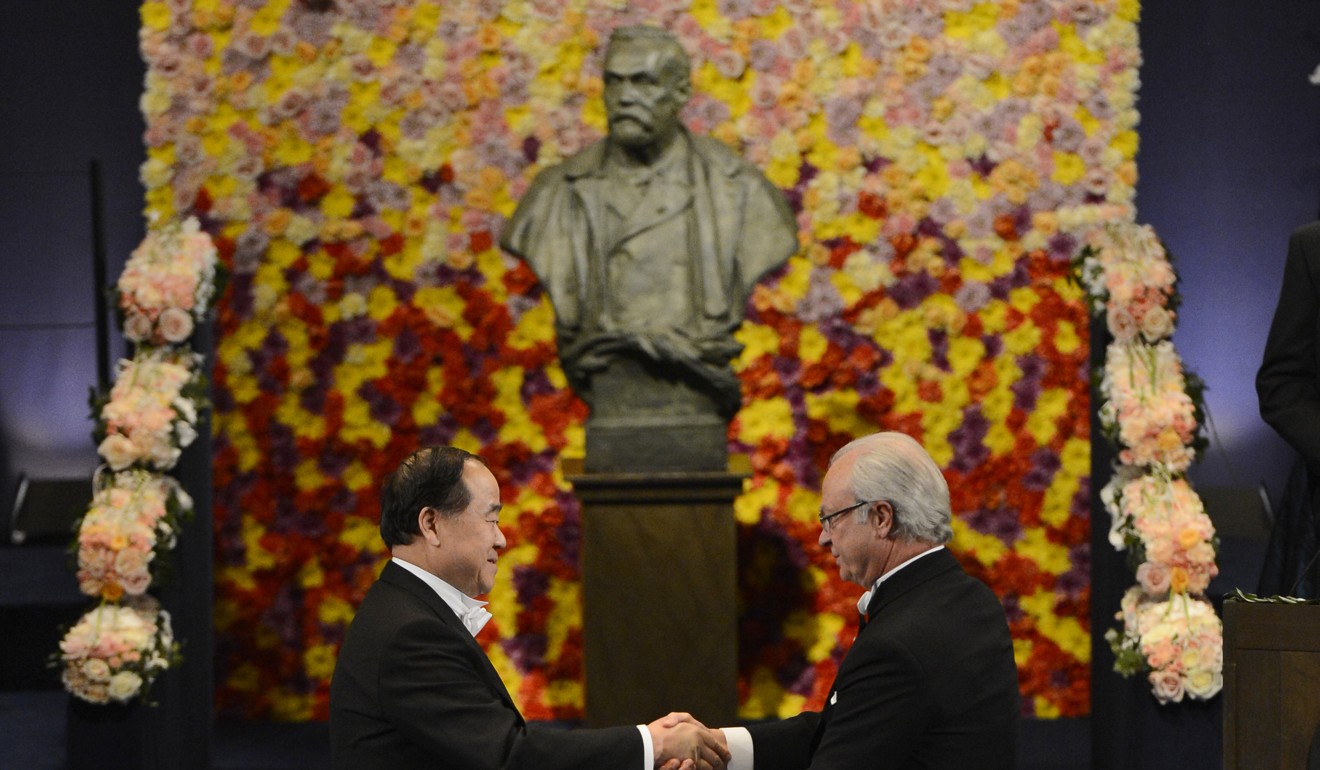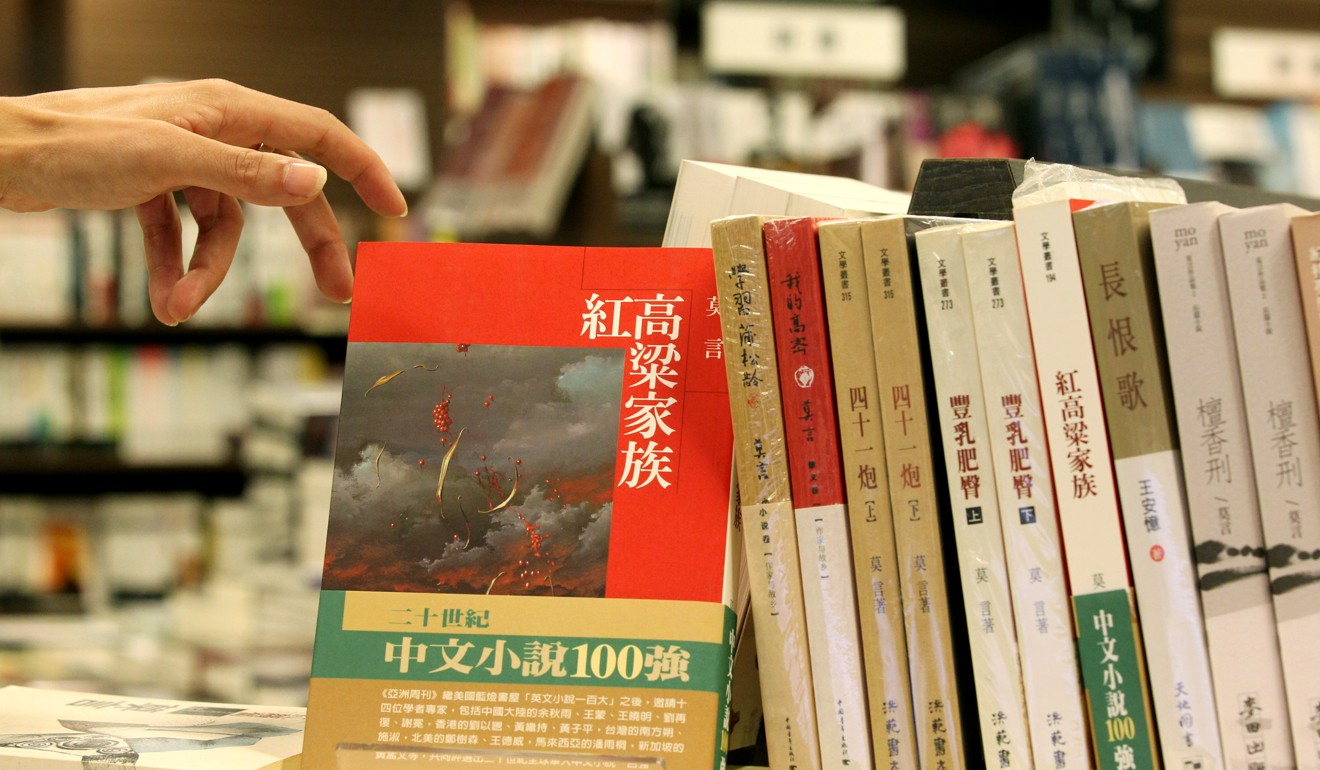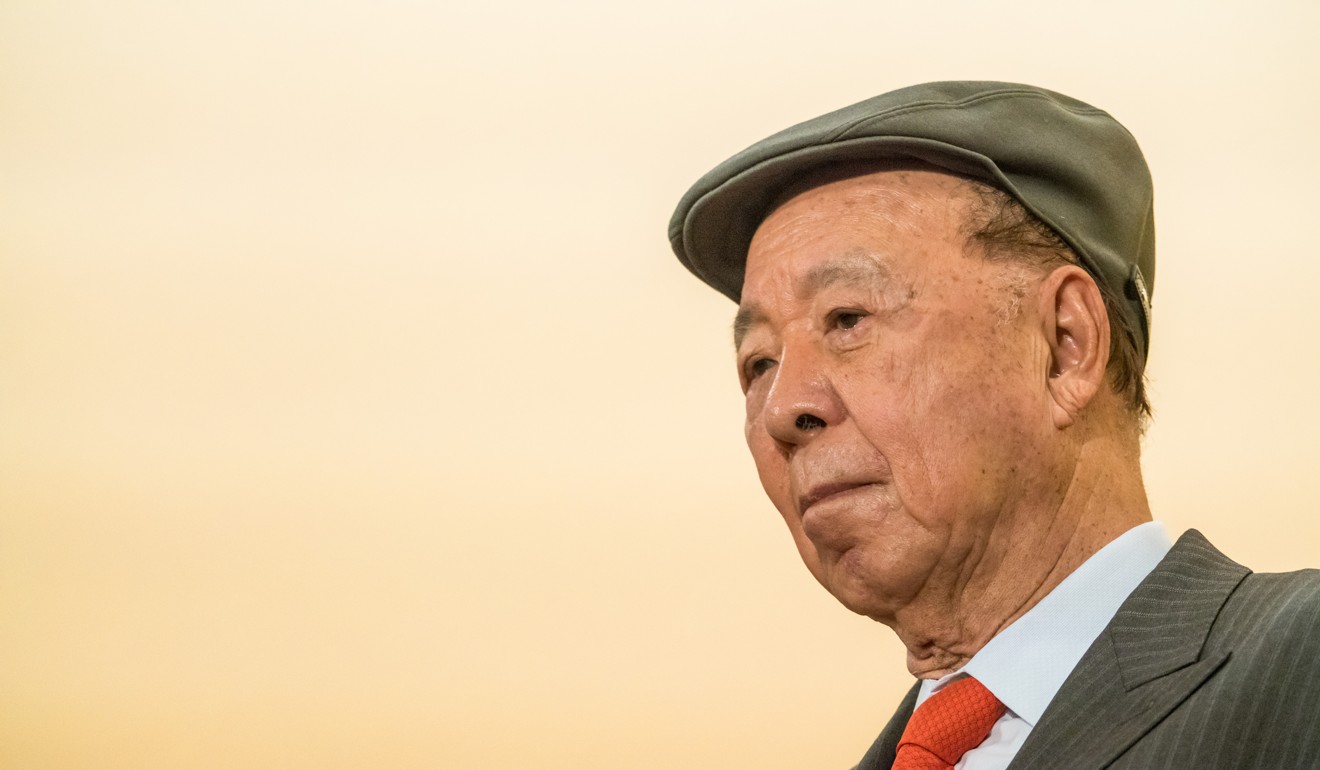Source: SCMP (5/5/18)
‘I needed to step out of the spotlight’: why Chinese Nobel Literature Prize winner Mo Yan is ready to start writing again
After five hectic years since winning the award, the renowned novelist explains why he has decided to scale down his public profile and return to his desk
By Sidney Leng

Mo Yan has spent much of the past five years in the public gaze, but is now refocusing on his writing. Photo: Jonathan Wong
After years of juggling speaking engagements and public commitments since winning the Nobel Literature Prize, Chinese writer Mo Yan now says it is time to get back to his writing desk.
Speaking in Hong Kong the 63-year-old novelist explained that he had gradually stepped away from the Nobel spotlight and learned to largely ignore the public’s high expectations, comparing himself to an athlete who needs to unwind to perform well in a major competition.
“Some athletes perform well in regular races, but they can’t compete at their best during international sport events, such as the Olympics,” he said.
“To some degree, it also applies to writers. When you are under lots of pressure and demand more from yourself, it’s not good for writing.”

Mo Yan collects his Nobel Prize from Sweden’s King Carl Gustaf in December 2012. Photo: AFP
After a five-year hiatus, Mo started publishing some short stories and poems in Chinese literature magazines late last year, although most of these works had been written before he was awarded the Nobel Prize in 2012 and he only recently polished them up for publication.
Mo is the only Chinese citizen to win the Nobel Prize for literature. Gao Xingjian, who was born in Ganzhou, Jiangxi province, in 1940, won the prize in 2000, three years after becoming a French citizen.
“During the first two years after [the award], there were so many invitations that even if I picked one out of 10 I was still fully occupied,” Mo said.
“Over the past two years, I feel I have paid back most of the favours that I owed my friends … so now I have more time for myself and my writing.”
These days he usually spends the morning reading, before sparing some time in the afternoon for catching up with friends and the news, and then devotes two hours in the evening – usually between 8pm and 10pm – to writing.
[Why writer Mo Yan thinks his Nobel Prize was a blessing and a curse]
But until recently he had many more demands on his time. In March, he became one of the most high-profile figures to stand down as one of the delegates to the annual Chinese People’s Political Consultative Conference in Beijing.
He had been nominated for the position in 2013 by the Chinese National Academy of Arts, something he later described as a responsibility rather than an honour.
During his five-year tenure, Mo delivered proposals for improving preschool education in rural areas, shortening the school year and increasing subsidies for families that lost their only child.
But the post brought with it long hours spent in meetings, as well as researching and drafting proposals, along with a bombardment of media interviews.
“My body simply cannot handle that amount of work. So I suggested not being elected for another tenure,” Mo said. “Besides, I want to focus more on my writing.”
He has dedicated much of his time over the past year to adapting his novels such as Red Sorghum and Sandalwood Death into theatre scripts.
Last April, he told an audience in Hong Kong that he was working on an anti-corruption novel and said he was a fan of the mainland television drama In the Name of the People, which centres on the government’s anti-corruption campaign.
But now Mo says: “My teaser is as untrustworthy as county-level weather report. The novel is not done. New material keeps coming.”

Mo Yan says he is getting back to work on a new novel, but warns that ‘new material keeps coming’. Photo: KY Cheng
Critics have often portrayed Mo as a writer “inside the establishment”– he has been the deputy chairman of the Communist Party-affiliated China Writers Association since 2011, an organisation often lambasted for being too close to the government.
In a 2013 interview with the South China Morning Post, Mo argued that censorship gave writers the motivation to challenge topics seen as taboos and described the 1980s as a golden period for literature when writers dared to confront forbidden topics creatively.
But recently he has become more discreet about issues such as censorship and ideological control, both of which have tightened since President Xi Jinping came to power.
Mo defended his position in an interview with the German magazine Der Spiegel and said he was writing on behalf of the people, not the party.
[Censorship has spurred writers, says Nobel Prize winner Mo Yan]
However, he drew heavy criticism in 2013 when he compared China’s censorship regime to an airport security check and again in 2016 when he praised Xi, who likes revealing his latest reading lists through state media, as “a prolific reader, someone with sophisticated taste for art, an expert” and “a leader of our thoughts”.

Mo believes the prize sponsored by entertainment mogul Lui Che-woo can one day match the Nobel Prize’s status. Photo: Bloomberg
When asked if he had witnessed any changes in the environment on the mainland, Mo answered: “I can only speak for myself … I feel I am still following my old writing style. And the topics as well as the people in my works also keep pace with times. There are historical figures, my memory of history, and people’s lives that are happening and changing.”
While he does not follow Hong Kong news closely, he said the Hongkongers who felt only a loose attachment to the mainland only represent a small group and he did not worry about relations between the two, adding: “History won’t backtrack”.
[China’s top climate change negotiator Xie Zhenhua to receive HK$20 million Hong Kong prize]
Mo visits the city twice a year in his capacity as a judge for the Lui Che Woo Prize – which he says could one day match the Nobel Prize’s influence.
The award, named after the gambling and entertainment mogul Lui Che-woo, grants prizes of HK$20 million (US$2.5 million) in three categories: sustainable development, improving people’s welfare and promoting “positive energy”.
This year the prize in the third category will focus on people or groups who have worked to tackle illiteracy, a topic Mo feels particularly strongly about.
He said it reminded him of people from his parents’ generation who did not know how to read and wrote and also brought back memories of his childhood, when as a primary school student he was mobilised to teach illiterate farmers.
Past winners of the prize include Xie Zhenhua, head of the Chinese delegation to the United Nations Climate Change Conference, China’s “father of hybrid rice” Yuan Longping, former US president Jimmy Carter, the International Paralympic Committee, Seattle-based NGO Landesa Rural Development Institute and medical humanitarian group Medecins Sans Frontieres.
Mo said the award, now in its third year, was a big prize “not only because of its unprecedented cash awards, but also because it sets a high bar and covers a wide array of fields, with a focus on issues influencing mankind”.
He said the success of the Nobel Prize is partly down to its 100-year history and widespread public engagement, but believed the newcomer can achieve a similar level of influence.
“We have studied the selection process and style of almost every prestigious award around the world … I believe it will become an international prize that attracts global attention,” he said.